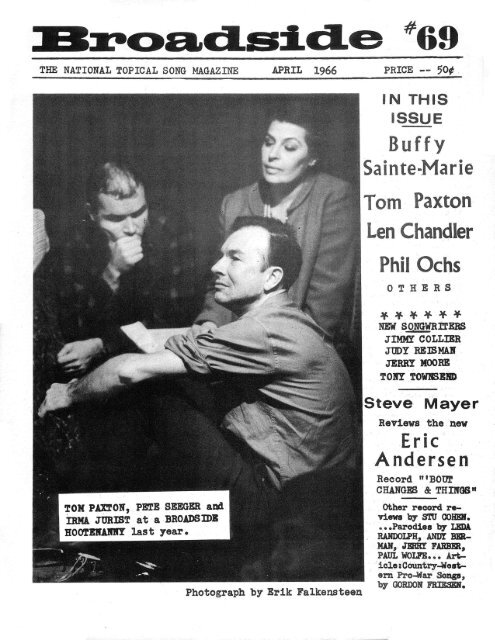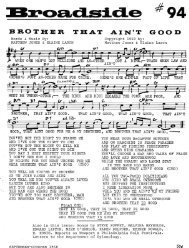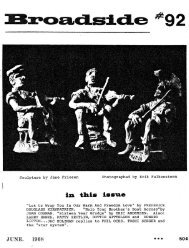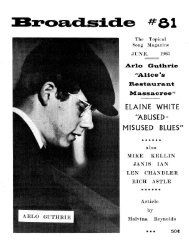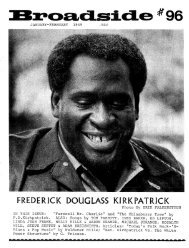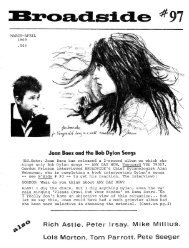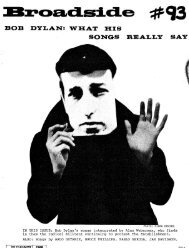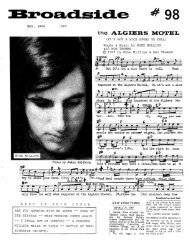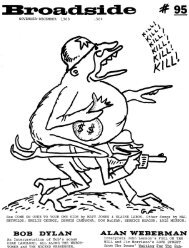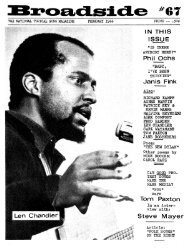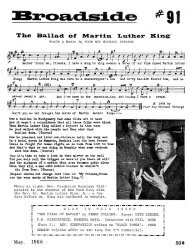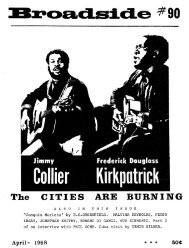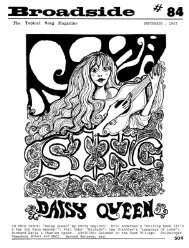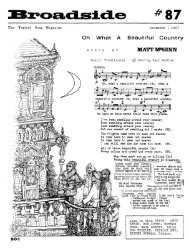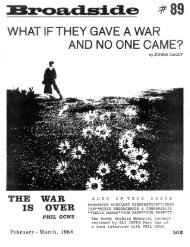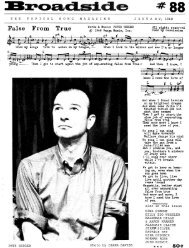b069
You also want an ePaper? Increase the reach of your titles
YUMPU automatically turns print PDFs into web optimized ePapers that Google loves.
THE NATIONAL TOPICAL SONG MAGAZINE APRIL 1966<br />
PRICE -- 50¢ .<br />
IN THIS<br />
ISSUE<br />
BUffy<br />
Sainte;Marie<br />
Tom Paxton<br />
Len Chandler<br />
Phil Ochs<br />
OTHERS<br />
".".".JflfJf<br />
.-<br />
NEW SONGWRlTEBS<br />
JIMMY COLLIER<br />
JUDY REISMAN<br />
JERRY MOORE<br />
TOllY . TOWNSBD<br />
Photograph by Erik Fa1kensteen<br />
teve: Mayer<br />
Reviews· the new<br />
Eric ·<br />
Andersen<br />
Record "'BOUT<br />
CHANGES &: THIlfOB"<br />
Other record reviews<br />
b;y STU COHER •<br />
•• • Parodies b;y LEDA<br />
RANDOLPH, AND! BEa-<br />
1Wf, JERRY FARBl!2,<br />
PAUL WOLFE • .;. Arloicl~:C6untr.r~estem<br />
Pro-War SOngs,<br />
by GORDON FRIESEN.
NEW YORK POST, THURSDAY, FEBRUARY 10, 1966<br />
The emptiness of American<br />
policy in Southeast Asia was<br />
never m0re manifest than tn<br />
President Johnson's invitation<br />
to the self·confessed admirer of<br />
Adolf Hitler, Premier Ky, to<br />
visit on American territory. The<br />
general has not only expressed<br />
admimtion for the arch brute<br />
of history but he has also pltb·<br />
J.jcly and consistently repudi·<br />
ated American efforts to seek an<br />
honorable peace.<br />
The premier should be made<br />
to understand that our people<br />
cJ'o )lot share his regard for<br />
MEN WHO<br />
Hider but that they do seek an<br />
end to the bloodshed in Viet<br />
Nam and the beginning of a<br />
new era of social, economic and<br />
political justice for all its people.<br />
The President's powers of per·<br />
suasion could have been em·<br />
ployed to good use in convinc·<br />
ing Ky that what his unhappy<br />
country needs is not a Hitler<br />
but a<br />
Lincoln, not war but<br />
peace.<br />
SAMUEL H. HOFSTADTER,<br />
Justice, Supreme Court of the<br />
State of New York.<br />
* 'fo 'fo<br />
DIE<br />
Words © 1966 by Leda Randolph<br />
Tune: "Green Berets ll •<br />
"Feeling that someone just had to come up with<br />
another set of words to that song I gave it a<br />
try and wound up with the following." L.R.<br />
Sing if you will -- to America's best<br />
With silver wings -- upon their chest<br />
Then of pris'ners -- in a torture cell<br />
Sing of the land -- we've made a hell.<br />
Chorus:<br />
On our way -- we bravely go<br />
Toward what end -- we little know<br />
War drums roll -- neath a dark'ning sky<br />
"Come,young men -- your turn to die."<br />
Trained to play the super race<br />
Trained to scorn a darker face<br />
Trained in all the ways to kill<br />
That small nations may know our will.(Cho.)<br />
In a hut a young wife waits<br />
Not knowing what has been his fate<br />
Not knowing if she too will live<br />
Where bombs are what we have to give.(Cho.)<br />
Sing if you will in this bitter hour<br />
Sing of the men gone mad with power<br />
Then of the child, the sun, the grass<br />
Of better days that could came to pass.<br />
But on our way we bravely go<br />
Toward what end we little know,<br />
And war drums roll neath dark' ning sky<br />
"Come,young men, your turn to die."<br />
"You AmerklUU dOKt umler.ttmtl. You are making beggars<br />
of our chiUren, prostitutes of our lDOmen, anll Communists<br />
01 our men."<br />
An American soldier was handing out candy to a bunch<br />
of kids. The man who unexpectedly spat these words out<br />
at him was not a North Vietnamese or a member of the<br />
Vietcong. He was a South Vietnamese schoolreacher-<br />
"AND HERGY HAS THE LAST THING ON lIT HIND"<br />
Vords copy-right 1966 by Paul Holfe<br />
"I've written this song-poem-whatever based<br />
on Bill Frederick's song in Broadside #55.<br />
I don't know if his tune fits, but naybe a<br />
nother can be found. II P.W.<br />
Through steaming jungle wastelands,<br />
beneath the virgin sky,<br />
I slashed the vines around me,<br />
and raised mw rifle high,<br />
Beyond the sea-green forest, the<br />
golden money shined,<br />
And mercy was the last thing on mw mind.<br />
- 2 -<br />
They shook the foreign shackles,<br />
they fought the tyrant's hold,<br />
They broke the hand that nailed them<br />
to a cross of blazing gold,<br />
But the battle that I waged was of a far,<br />
far different kind,<br />
And mercy was the last thing on mw mind.<br />
Rifles rang and bullets sang,<br />
and the jungle sky grew red,<br />
And dusty rains fell hard upon the dark,<br />
the bowed, the dead,<br />
My bootheels thrashed the muddy path,<br />
I never looked behind,<br />
And mercy was the last thing on mw mind.<br />
The flowers fall on muddy graves,<br />
the moon has turned to sand,<br />
But soon enough, the greenback stuff<br />
will lie right in mw hand,<br />
War is war, death is death, and many<br />
are the chains that bind,<br />
And mercy was the last thing on mw mind.<br />
"THE LIBERAL SONG"<br />
Words @1966 by Jerry Farber<br />
Tune: Calypso,"Marianne"<br />
"The Liberal Song has spread around considerably<br />
since I first wrote it several months ago.<br />
Friends of mine have heard it in San Francisco,<br />
in Selma, Alabama, and in Monroe and New Orleans,<br />
Louisiana." J.F.<br />
Walking on the picket line,<br />
Carrying mw freedom sign,<br />
When up came a liberal anxiously.<br />
These are the words he said to me:<br />
(Cho)You're only hurting your cause this way.<br />
That's what all of us liberals say.<br />
Nobody likes things the way they are<br />
But you go too fast and you go too far.<br />
Hebrew children by the Red Sea shore<br />
Walked through the water four by four<br />
Moses let old Pharoah swim<br />
Here's what the Pharaoh said to him: (Cho)<br />
Three wise men on camelback<br />
Two were white and one was black<br />
Freedom-riding to Bethlehem<br />
When somebody gave this advice to them: (Cho)<br />
All night long they were making tea<br />
At the Boston Harbor jambore~<br />
A liberal ran to the water's side<br />
And he called to them across the tide: (Cho)<br />
Frederick Douglass broke the color bar<br />
When he rode on a train in the white folks' car<br />
They said "Get up" but he would not go<br />
What they told him we all know: (Cho)<br />
God gave Noah the rainbow sign<br />
Won't be water but the fire next time<br />
And when the fires are blazing away<br />
The liberals will look up to God and say: (Cho)<br />
.B R{)fWS/.J)E ito9
Words by DUDLEY .RANDAI.J:,<br />
- 3 -<br />
Music by JERRI MOORE<br />
BALLAD OF BIRMINGHAM Copyright 1965 by<br />
,<br />
kt<br />
-<br />
Eju J ail;!<br />
1<br />
j,t~(3<br />
jJ<br />
Melody Trails,Inc.<br />
5' r l<br />
the streets ot Bir- ming- ham in a<br />
and hos- es, guns and jails aren't<br />
~~ .,..<br />
child. - 3. But<br />
in a free-dom march to- '.day.<br />
One of the events of the tragic sixties in the U.S.A.<br />
th&t shocked huaans around the world was the bombing<br />
ot the 16th St. Baptist Church in BinDingham, Alabama,<br />
on Sunday morning, Sept. 15,1963. Four young<br />
girls - Cynthia Wesley, Carol McNair, Carol Robertson,<br />
and A.ddie Mae Collins - were killed in the dynamite<br />
blast. It WIlS one ot more than 60 bombings in<br />
Alabama directed against the Negro people that remain<br />
"unsolved" to this day.<br />
Reaction to the shocking murder ot the four girls in<br />
SundaT school was worldwide. On the day a!ter the<br />
bombing the people ot Wales began raising money for<br />
a stained glass window for the church they knew must<br />
be rebuilt. (The window shows an agonized Negro Jesus<br />
being·'pounded by torrents of water from firehoses).<br />
The first song about the bombing received by Broadside<br />
came trom faraway Australia (it is in # J4")":"'"<br />
There have been man;r since. Richard Farina's "Birmingham<br />
SUnday" was in # 48 and has been recorded<br />
by' Joan Baes.<br />
"The Ballad Of BinDingham" on this page began as<br />
a poem by' Dudley Randall. It was set to music by'<br />
Jerry Moore, and is being recorded by' JeI'r7 on an<br />
L-P album he is doing for Columbia Records. We<br />
consider it a truly great song, both in words and<br />
music.<br />
JeI'r7 Moore is a young guitar player and singersongwriter<br />
.originall.y' from New York. He went to<br />
Morris College in South Carolina where he sang in<br />
the choir,became active in Civil Rights, and<br />
took part in the Freedom Rides. After college he<br />
returned to New York and began singing in the Greenwich<br />
Village coffee places called "basket houses"<br />
(the performers aren't paid and must try to sta;r<br />
alive by passing a basket among the customers).It<br />
was there he came to the attention of Columbia,<br />
which put him. under contract. Like Len Chandler,<br />
Julius Lester and other of today's song-writerperformers,<br />
JeI'r7 is quite versatile, his songs<br />
ranging from folk to protest to blues.<br />
.J3R OAIJ5 / JJ E. .p 69
-4-<br />
Words 8t Music: BALLAD of ANNIE HAYES Copyright 1965<br />
JUDI REISMAN (. ~~~~<br />
! For Unaccompanied Sll1ging) + -....eft<br />
rm p J pi OFf Ei I r I ~ Li cO I 6 I L .I<br />
An-nie B. Hayes, Se, Annie Hayes, IE did you end your maid-en days? ---<br />
~' ,;- ~ e ~ .., ~ ~ - - (Cho.) .$f=<br />
P<br />
l P fir t:t, F ¥ \ 0 r I I<br />
r A 1 F;l I r J \ f' II:J \<br />
Torn a- sunder by the great white !a-thers -- One two three<br />
~ ~IN~ ~ ~ (vers~<br />
t= IpF plOt: SlphV6)i£1P~H ; I!<br />
tour.<br />
fir ,. .... /~<br />
An-nie<br />
ju-<br />
M:int<br />
t<br />
: I<br />
Smell that<br />
stead o! white. ( to Chorus ) And of! you go now, Ann~, speeding a-way, breaking inside,<br />
Gl ~ i 9 '1§9j· Wt~~:S~sl~ ~~!~:or'::ea~:~f~;::~t!n;r:: :Y~8~S~o:O:n::J-<br />
__ _ _ =---- 2) The writer suggests singing the song an octave lower than written<br />
lau all a-bout you, •••• - or as it' in "alto-tenor" register.<br />
Poking good fun and teasing - nothing too bad yet<br />
Perhaps you III get away lucky'<br />
Like some of the others.<br />
The car has stopped and now the fun begins<br />
Try- and pass us by, little black girl<br />
Donlt. be afraid - have a slug o! gin, welre only your friends<br />
Knew you since you were small, good family'men one and all<br />
(spoken) CATCH HER<br />
Now dOlm you go m:r little girl - (yelled) YAH-HOO<br />
The ripping and the teariIigi the crying and the pain<br />
The laughing and the cutting, and again - again - again. (cho.)<br />
13"RDffJJ.5I1J£<br />
To hear just how Judy Reisman sings this song one needs her L-P<br />
record "New Sounds ~ Judy Reisman" (!or information as to where<br />
to get it write her at 25211 Yacht Drive, Dana Point, California).<br />
The album has eleven other songs ot' her 0'Wl1 composition, including<br />
l'Where Freedan Ends II ,about the church bombing in Alabama.She<br />
has been singing them with tine response on the West Coast,at<br />
colleges, high schools, political functions, and the Ash Grove<br />
in Hollywood.<br />
(continued~)<br />
fl69<br />
You're lying on the ground, Annie<br />
That's your Olm blood all around, Annie<br />
Your mother she is crying<br />
Your father carried you inside<br />
The clinic wouldn't help you<br />
The sherif! said "Get out.!"<br />
So you died. (cho.)<br />
(DC al FINE)<br />
NEW YORK TIl\lES,<br />
MARCH 29, 1966.<br />
Doomed Negro. Loses Plea<br />
In a Florida Rape<br />
W ASHlNCTuN, March 2<br />
(AP)-T"Ile Supreme .. Co!li1:<br />
denied today '& hearing to '&<br />
Florida Negro who said .<br />
death penalty had been u.se1 .<br />
an instrument of diScrtmlnation<br />
against membrrs of his race<br />
conVicted of raping white<br />
women.<br />
A hearing was asked by Wn..<br />
liam BenjamiU Craig, convicted<br />
in the Circuit Court in Leon<br />
County, Fla .• on. June 27. 1ll63.<br />
lHe was sentended to die for<br />
the npe of a white. woman:.
Ju~ Reisman -- 2<br />
- 5 -<br />
Ju~ wrote "The Ball.a.d Of Annie Hayes" one evening aIter reading a report of her death<br />
in the ACUl' Annual Bulletin. She writes: "Frankly, aIter I read the account I was completely<br />
distraught and worked until 2:00 in the morning - writing and singing what I<br />
had written... The ma."terial in the song is a musical kind of reporting of the tacts."<br />
Brietly, the story of Annie B. Hayes, 16, is this: She was walking to work in Sumter<br />
County, Georgia, one summer day in July, 1963, accompanied by her 12-year-old brother.<br />
Four white men in a car pulled alongside. They dragged Annie into the car and drove<br />
away. That evening they dumped her raped, broken body out in front of her home. Refused<br />
treatment at a nearby cliniC", she died two days later. Knowing the brother had<br />
recognized them, one of the men came to the Hayes home and threatened the entire family<br />
- father,mother, and seven surviving children -- with death if their identity was<br />
eTer reTealed. But the boy did go to the county seat of Americus and tell the law the<br />
names ot the four men. The law responded by making the boy get down on his knees and<br />
swear what he had said was a lie. So strong was the death threat that the family could<br />
not bring itself to co-operate with SNCC workers who tried to get action on the case.<br />
The murd~r of Annie Hayes remains "unsolved" to this day, along with thlDusands of other<br />
crimes against the Negro citizens of the American South. For contrast of how a Negro is<br />
still being treated in 1966 where he is accused of "rape" of a white wcman see clipping<br />
on preceding page.<br />
G.F.<br />
Bf -JIlIN . A. FB4NKLlN<br />
~"""Jl"Y~<br />
WASBlNaTON, AJ)l1l 3-<br />
Abotit<br />
30 weUy 'Mlssilistppl.<br />
plantation workers, forced to<br />
jive In tents lIec&uae they have<br />
lost their homes and jobe in<br />
the Delta. cotton fields, pitched<br />
",ymbollc" -tents In Lafayette<br />
Square this &ftemoon andca.mPed<br />
out for the nlght cIireetly<br />
&cross PonnsylVlUlia<br />
Avenue from the WhI~ Howe._<br />
~ttanget<br />
Words & Music by ERIC ANDn1SEN<br />
To<br />
MONDAY, APRIL 4, 1966.<br />
Over a portallle pubUc &4-<br />
dress' amplifier, Bishop WUliams<br />
repeatedly' hailed Mr.<br />
Johnson by shouting 'Mr. President,<br />
Mr. Presldellt, Mr. President'<br />
across the lOO-yard' distance<br />
to the WhIte House.<br />
"We are not asktni to come<br />
sit at your table," hI! said. ''We<br />
are just a.sklng for the crumbs<br />
that fall from Mr. sargent<br />
ShrIver'" table." Mr. Sbrtver iJI<br />
head of thl! antipoverty agency.<br />
Thi~<br />
Countty<br />
Copyright 1965 by Deep Fork MUsic,Inc.<br />
~, 7:5"<br />
,,- Oh I am. a stran~ to this coun- trr;-_ I am. a stranger to this land, ---<br />
~?JJrIPlj.lIEJljJ.J_J I j j J iTa. J Wi~J ,J I : __ 1<br />
- And IIll go rrr:r way til my dy - in' day Al-ways lookin' for a- weI-come hand,--<br />
~ J J J it' J, j J IA I I g.. I I II<br />
2. Alone I will follow my freedom star<br />
Or until I hear the trumpet sound<br />
And I'll fight the cold<br />
til they lower rrr:r body<br />
Til rrr:r blood spills on my buryin'<br />
ground.<br />
4. So boys you soon will be men now<br />
And on your backs the world will fall;<br />
30 keep clear hearts<br />
and your bodies strong<br />
For YOUl'S is the greatest call of all.<br />
3. Here is the question we must all ask<br />
5. Someday all nations will rise to this call<br />
In this land of liberty<br />
And men will join their hearts and hands;<br />
How can brave men<br />
And we'll stop all the wars<br />
with cherished hope<br />
and the blood and the tears<br />
Ever find a way to be free?<br />
And the hungry children cry-in'<br />
BROfilJ.5 II) E frb9 in these lands. (Repeat first verse).
- 6 -<br />
BURN, BABY, BURN<br />
I called President Johnson on the phone,<br />
The Secretary said he wasn't there.<br />
I tried to get in touch with Mr. Humphrey,<br />
They cotildn' t find him anywhere.<br />
I went into the courtroom, with ray poor sad face,<br />
Didn't have no money, didn't have no lawyer,<br />
They wouldn't plead ~ case, so I said - (Cho.)<br />
I heard people talking about a dream,now,a dream<br />
I couldn't catch,<br />
I really wanted to be somebo~ and all I had was<br />
a match.<br />
Couldn't get oU from Rockefellers' wells<br />
Couldn't get diamonds from the mine<br />
If I can't enjoy the American Dream, won't be water<br />
but tire next time,<br />
So I said - (Cha.)<br />
Walkin' around the west side now ,1ookin' mean and<br />
mad<br />
Deep down inside ~ heart,I'm feeling sorry and sad<br />
Got a knife and a razor blade, everybody that I<br />
know is tough,<br />
But when I burned my way out of the ghetto,<br />
I burned my own sel! up, when I said - (Cho.)<br />
Learn baby, learn<br />
Learn baby, learn<br />
You need a concern<br />
You've got money to earn<br />
You've got midnight oil to burn, baby burn<br />
I really want a decent education, I really want a<br />
decent place to stay<br />
I really want some decent clothes, now,<br />
I really want a decent family<br />
I r eally want a decent life like everybody else •• •<br />
Words and Music by<br />
JIMMY COIJ..IER<br />
@ 1966 by Ji.mIDy' Collier<br />
Burn, baby, bum;--<br />
No-ldlere to be,- No one to see- I said-a No-where to turn,-<br />
BROAD<br />
S, I.D£<br />
#69 ·
.,<br />
1m bound to fly<br />
t!<br />
&<br />
- 7 -<br />
Words & Hus ic<br />
IEN H. C~LmIER,<br />
"~4in ba.ss E.m Am<br />
2 I ( ! I \ :t =t J I t 2' ' ~ n I, I J ~" I 4 ill<br />
JR.<br />
OCF mind-"- :r And still the silver ""'Ii- lace -.- of reason webs my skin,- --<br />
keeps me in - I'm bound to<br />
-:l Aj , . ~ " c e- ~ 1>)3 II.AST"C TIME. l>)',l<br />
"*' l' U [~ ;,Cd £ 11 i J j a;J;fA J :\1 ~ ! J Jj rc.<br />
It's a base ignoble mind and nothing more<br />
That can fly no higher than a bird can soar<br />
And when my body learns to keep up with my mind<br />
Then I'll be fine, then I will ny, I'm bound to ny.<br />
Cold unimspired equations keep me down<br />
It's by a graver law than gravity I'm bound<br />
And by escaping laws of logic I am free<br />
Or soon shall be ••••• I'm bound to fly, I'm bound to fly.<br />
It's an ostrich tutored posture you maintain<br />
because you have a heart of lead and a feathered brain<br />
And if you must keep your head down in the sand<br />
Let go my hand •••• I'm bound to tly-, I'm bound to ny<br />
Tell your jet propulsion warhawks at their play<br />
That they've never left the ground in any way<br />
And with their space dreams ot a universal slave<br />
They're in the cave •••• I'm bound to fly-, I'm bound<br />
to fly.<br />
And it seems that I've been living out my days<br />
Beneath a dark and a densely evil haze<br />
And now I know that I've never seen the sky<br />
And that is why •••• I'm bound to ny, I'm bound to fly.<br />
@ copyright 1966 by E. B. Marks Music Corp. B.M.I.<br />
A greafJ't/ew·Sfar Is 80rnl<br />
8y GardOR N. Converse, chief photographer<br />
A brighter<br />
future?<br />
A young lad plays witbtbe windu the brich<br />
a~ Accra. His countr;rmen, .lI,itpa~tJs.ju~<br />
iant over the ouster· ·Gf· tJielr'fo1."mer PrllSt'!"<br />
dmt, look to the new military regime for<br />
economic reforms.<br />
Columbia Reco<br />
UN CHANDLER "TO BE A MAN"<br />
...BRtJADS mE. ""69<br />
CHRISTIAN SCIENCE MONITOR Wednesday, Mareh 16, 1966<br />
(Ed. Note: See 5th verse of Len's song for his<br />
assessment of what "econanic reforms" or anything<br />
else of human value can be expected<br />
from "military reg:lJnes".)
Move On Over<br />
TUlle Traditional<br />
John Brown's Body<br />
WordS .. Len Chandler, Jr.<br />
Cl985 Fall River Music, Inc.<br />
- 8 -<br />
(The chorus 15 sung between each verse.)<br />
Mine eyes have seen injustice in each<br />
City, town and state<br />
Your ja1Ls are fUled with black men and<br />
your courts are white with hate<br />
And wlth every bld for freedom someone<br />
whispers to us wait<br />
That's why we keep marching on<br />
Chorus<br />
Move on over or we'l1 move on over you<br />
Move on over or we'll move on over you<br />
Move on over or we'll move on over you<br />
And the movement's moving on.<br />
Your dove of peace with bloody beak<br />
sinks talons in a child<br />
You bend the olive branch to make a<br />
bow, then with a smile<br />
You string it with the lynch rope you've<br />
been hiding all the while<br />
That's why we keep marching on.<br />
It Is you who are subversive, you're<br />
the killers of the dream<br />
In a savage world of bandits it 15 you<br />
who are extreme<br />
You never take your earmuffs off nor<br />
listen when we scream<br />
That's whlC we keep marching on.<br />
I declare my independence from the<br />
fool and from the knave<br />
I declare my independence from the<br />
coward and the slave<br />
I declare that I will fight tor right and<br />
fear no jail nor grave<br />
That's why we mep marching on.<br />
You conspire to keep us silent in the Many noble dreams are dreamed by<br />
field and in the slum<br />
small and voiceless men<br />
You promise us the vote then sing<br />
us We Shall Overcome<br />
Many noble deeds are dODe the rigbteoQs<br />
to defend .<br />
But John Brown knew what freedom We're here today, John Brown., to say<br />
was and died to win us some<br />
we'll triumph in the end<br />
That's why we keep marehing on. That's why we map marchiDg on<br />
(Reprinted from SmG 0011 'Magazine, AprU-May 1966)
By LAWRENCE E. DAVIES<br />
Special to The New York Times<br />
PARLIER, Calif., March 24<br />
-A colorful ~olumn, banners<br />
flying, moved along back highways<br />
In the San Joaquin Valley<br />
today, past pruned vineyards,<br />
tomato and cotton fields and<br />
rich .plowed land.<br />
In the vanguard trudged the<br />
proud bearer of a silk and velvet<br />
tapestry. depictillg Our Lady<br />
of Guadalupe, a national and<br />
religious. symbol of Mexico. On<br />
ei ther side fellow marchers car·<br />
ried United States and Mexican.<br />
flags.<br />
'<br />
Behind them a dozen big red<br />
balll1ers, each decorated with. a<br />
black thunderbird In ·a white<br />
circle, were ~st Wgh above<br />
the shoulders of a band of pilgrims<br />
on an unusual missi6n.<br />
The thunderbird is the official<br />
symbol of the National Farm·<br />
Workers Union, an unaffiliated<br />
family assocIation. The paraders<br />
were 70 or so members of t11e<br />
union-men and women, fat and<br />
thin, mostiy Mexican-Americans,<br />
but with a sprinkling of<br />
Negroes and whites.<br />
Some wo.re.,red ponchos, with·<br />
the thundetbird.and~he Spanish<br />
word "Huelga," meaning<br />
"strike," inscribed across the<br />
back. All, despite blistered and<br />
aching feet, were bent on reaching<br />
the· state Capitol in Sacramento<br />
on Easter Sunday, April<br />
10, for a rally after a 300-mile<br />
trek from Delano, center of a<br />
grape 'pickers' strike that began<br />
on· Sept: 8.<br />
Party 15 Relaxed<br />
This· wu not a taut', emotional<br />
group of singers. It was<br />
a: relaxed party,· reflecting<br />
pa:tienco.. a~d determination,'<br />
~U-ol'dered, ·quie. t for the mostl<br />
pllrfbut occasionally chanting<br />
"Viva la huelgll" [long live thel<br />
strike] to the time of a guitarl<br />
or accordion., Accompanying<br />
state hi!l!.hway patrolmen "nd<br />
sheriff's· deputies have had<br />
nothing ...to . do exbept the.<br />
s!g~.moving on l<br />
i<br />
- 9 -<br />
Huelga Huelga<br />
(DO NOT CROSS THE LINE)<br />
/>,1'(\ I \<br />
Words & Music by<br />
MALVINA REYNOLDS<br />
6> 1966 Schroder<br />
Music Co.- ASCAP<br />
Huel ga Huel - ga Leave the grapes a -<br />
When we try to or-gan-ize They throw us in the<br />
C<br />
G owers and dis- till- ers, They have hearts of<br />
If.. we have a un -ion We'r can live like men,<br />
r ~. 11~ I I<br />
~"m ~ ~ ~ J , r iI. r<br />
r ~<br />
pay s ar-va- tion wa- ges, Their lives are rich and fine,<br />
ra-ther see us hungry While they get rich on I wine,<br />
l'r<br />
r IJ<br />
~'ffl .<br />
i ~ ~1~ ~ ~I , lEr:<br />
Huel - ga, Huel ga, Do not cross the line.<br />
ga, Huel ga, Do not cross the lin>e.<br />
II'<br />
lone.<br />
pen,<br />
Don't drink Schenley's whisky or any Schenley<br />
brand,<br />
I. W. Harper, Seager's, Ron Cruzan<br />
Ancient Age or Cutty Sark or Cresta Blanca Wine,<br />
Huelga, huelga,--Do not cross the line.<br />
'I I<br />
Support of our unions is everJrbody's task<br />
One forty an hour isn't much to ask;<br />
Make the growers understand we're going to win<br />
this time,<br />
Huelga, huelga,--Do not cross the line.<br />
Keep away from Roma, don't drink Cook's Champagne,<br />
scabby grapes, conditions are a<br />
not cross the line.<br />
yours and<br />
As nearly 1,000 members of striking farm W~ tIfilons marched<br />
in Delano on Sunday. desperate grape growers were employing six. year<br />
old strikebreakers in an attempt to stop the workers' drive for "better<br />
.. wages and a unio~ contract.<br />
.BROfJ.DSI.lJE. #69
- 10 -<br />
l10rds & Music by TorIT TOvlNSEND<br />
@ 1966 I1hitfeld Music, Inc.<br />
~ Oh the winds of change are blowing 'cross the land, Rippling the earth and the seas, And the<br />
.t, p~c} VHl'~4 ~1.stJs4 ~ Jr-'j Pf!{J3 Li A1t03g p.su:A Chorus: 1'~<br />
~ J j 1 :elY J g ; ~\ n r ! j jig, €sf!<br />
sand all heed the wind's command, And its mighty breath topples the trees. When the<br />
£y- l'1U>.3 d A?Ib 3a ~<br />
F tllEJi CJ r plJ r J fOIQ, :A4<br />
gi- ants speak but the trembling and the weak Don't heed their warnings with fear, Then the<br />
M.?'p &-t'1 .l'~ A"s~~4 ~1 &- C if than lose my own free mind.<br />
~~t'§1 ~r~' $p~r ~ril ~r~9~r l~r~'~p ~r~r~l~r~' ~ I'Ve 5s'een the young girl marching<br />
t I down the southern street<br />
vii th hoses turned upon her,<br />
* U lie r; rj f I Ie r T"j<br />
They're searching for a freedom so man- y fail to find,<br />
&,<br />
I<br />
1-1).'7·. J j I' v~O~!a~~alh!n~O~~h h::b~::ing<br />
~. . I Ii. I ,; i t; the South to her unbind<br />
When the one great freedom all men need is free-dOJll in their But the South is free much les s<br />
than she-- there's freedom<br />
~~~~~~J~~~~III 2. I'V~O~~~~y~~esh~~~!e sprawling between our in her mind.<br />
I've seen them as they struggled against So l~~g as men are willing<br />
minds. privation's sores to march against the foe<br />
They're searching for a freedom so many fail to find So long as men can question<br />
When the one great freedom all men need is freedom in so long as men can know<br />
their minds.<br />
So long as tyrants cannot pierce<br />
the mind's own sanctity<br />
3. It ve seen the ugly censors blockade the thoughtful sea So<br />
And set its waters boiling by burning books for heat<br />
long as each his thought's<br />
They dream about a world where new ideas no voice can<br />
can preach, so long will men<br />
find<br />
be free.<br />
j;JRfJ!fD5/.DE #69<br />
Our great country cannot be free with chains upon its<br />
mind.
-ll-<br />
Take It Out Of My Youth<br />
Words & Music: PHIL OCHS<br />
@ 1965 BARRICADE Music, Inc.<br />
~ ~ ~<br />
Jj":! J, PI f J. 191* p' pi F F J\-=yztlf1f!I- ~ I<br />
The young night was thirsty as I entered the back of the bar, The<br />
j J an J a iJ a I J J at{£jfJI 1,/JJIlI- rl- r' pi<br />
smoke held the air, as the floating tables were scarred, ~- In back of the<br />
,,1 F J'm ~ ..D1'n<br />
f j, P I r it I J - ;Ji.tJ;4;l1- J bj J 2 I ~ J) J g. ~ I<br />
counter the man asked ''What can I do?" And all I could --- "On th<br />
"1'''' F" say was e on e<br />
~ 11 J.~IJJJIU~I 1)11<br />
way,<br />
.I ./<br />
, I<br />
-'-.<br />
~--- -<br />
And the voice from the juke box was singing much<br />
more than a song<br />
The magic of !nUsic picked up my mind and was gone<br />
Caressed by a corner I sat in the shadows of blue<br />
My glass quickly drained, I called out the name<br />
Said take it out of my youth.<br />
l~y eyes were drafi"il to the da.."'1cers forsakL"1g<br />
their days<br />
Swaying and swirling they shook with the passions<br />
of play<br />
In total abandon the freedom of fren~ it grew<br />
And just as before, I'll have one more<br />
And take it out of my youth.<br />
The women were wearing the paint that covered<br />
their frowns<br />
Fluid and flowing and formed in the loose fitting<br />
gowns<br />
So I said to my friend let's do it again<br />
And take it out of my youth.<br />
And the sounds were obscene as the wine-drop visions<br />
were blurred<br />
As the hours escaped to dungeons of wet empty words<br />
My mind was swimming in a sea too familiar to fool<br />
So I gave him the sign, just one more time<br />
And take it out of my youth.<br />
NO'\r1 a toa.st to tomorrow a.s 1tle da.:."1ce on the fa.st ~oll=<br />
ing logs<br />
And a toast to today as frustration is dro\ol!led in<br />
the fog<br />
Lost to the world, lost to each other, it's true<br />
The signal was down, just one mo~e round<br />
And take it out of my youth.<br />
And the world disappeared as though shot with a warm<br />
whisky gun<br />
As proudly we played and frolicked in desperate fun<br />
The cold night was laughing and waiting outside of<br />
the room<br />
So here's where I'll stand and drink with the damned<br />
And take it out of my youth.<br />
#6'3
- 12 -<br />
Little Wheel Spin And Spin<br />
By BUFFY SAINTE-MARIE @ 1966 Gypsy Boy Music, Inc.<br />
(Title song of Burfy's newly released Vanguard LP)<br />
j,<br />
~~~~=<br />
~<br />
f1!! -<br />
~~ :£t J.I :f J I .' J Jf I I i I I I 1 i I.r J I<br />
-<br />
L<br />
Christ is born and the devil's in hell • .,.... Hearts they shrink and pockets swell. Ev'ry-body know and<br />
J).C.<br />
2."Oh, the sins of Caesar's men!"<br />
Cry the pious citizens<br />
Who petty thieve the 5-and-10<br />
..... -- .... ....-~.,.<br />
no-bodwt -tell.-<br />
"f ttl \ \ II<br />
And the big wheel turn around<br />
and around. (Cho.)<br />
4. Turn your back on weeds you've hoed<br />
Silly. sinful sins you've sowed<br />
Add your straw to the camel's load<br />
Pray like hell when the world explode!<br />
(Cho.)<br />
....,.....<br />
3. Blame the angels, blame your fate<br />
Blame the Jews or your sister Kate<br />
Teach your children who to hate<br />
And the bi~ wheel turn around<br />
(Cho. )<br />
5. ItSwing your girl", fiddler say<br />
"Later on the piper pay, It<br />
Do-si-do and swing and sway<br />
Dead will dance on Judgement Day<br />
(Cho. )<br />
WA£Rt W£Rf. You WH£N fA£ L1GHfS W£N1 OUf<br />
Words & Music by TOM PAXTON @ 1966 by Deep Fork Music, Inc.<br />
't ~J d= J ;9 12 :fJ j I ! J J J J J -r~! ;P I<br />
~ l' 1. Wh":; w~re you whe~e j5-ghts went~? ~ Where were you when ~j lights wentJfl?' ~<br />
if J ]:p j J F[j I J 3 IjJ j J I \ Iii] nJ;; :0 I<br />
drove my tax-i far and wide, A helping hand I<br />
~~ g,1 A<br />
-..- ~~:;;=-v .... +<br />
did provide Getting fifteen bucks a rid~ When the<br />
¥J \ r ~ I II 2. Where were you when the lights went out? (2X)<br />
~ > ~, -;- --;r \: ~ In Centr~l Park be~~d a" tree, ~o mug som~~ne_ if. ~ could see<br />
~~gh~s went out last night. Wnen sudaenly someooay c~obberea me when ~ne llgh~s went out<br />
last night.<br />
3. Where were you when the lights went out? (2X)<br />
Somewhere up near the 35th floor. picking the lock on the bosses door<br />
For we couldn't have a party without something to pour when the lights went out last night.<br />
I±. Where were you when the lights went out. (2X)<br />
Down at Con Edison all through the night where they kept on saying things would be all right,<br />
But I had to wonder when they asked me for a light when the lights went out last night.<br />
5. Where were you when the lights went out? (2X)<br />
From answering I must refrain, my Con Ed job I s gone down the drain<br />
And I made a reservation on a flight to Spain when the lights went out last night •<br />
.BR(J(-J.1JSID£ #69
"ANTI DRAFT-DODGER RAGtf - 13 -<br />
Words @1966 by Andy Berman<br />
"Here is a parody ot Phil Ochs' "Draft Dodger<br />
Rag" that has been circulating around the SD-S<br />
chapter at Queens College." A.B.<br />
I'm just a typical radical now,<br />
From a typical left-wing throng,<br />
I believe in SNCC<br />
and hate Dick Nix,<br />
And I love the Viet Congo<br />
But when it came my time to serve<br />
I said "better fink than clink"<br />
So when 50s asked about anti-draft,<br />
I told them what I think:<br />
Cho:<br />
11m a college red, but I'm still pre-Med,<br />
So don't think I'm a fool.<br />
I'm no sap; I love ERAP,<br />
but I want to go to dental school.<br />
Sure I'll protest the war, join the peace corps,<br />
And I'll vote for Eric Hass.<br />
Don't get me wrong, my committment's strong,<br />
But I'll stick around the middle class.<br />
Well, those poor C.O.'s, they've sure got woes,<br />
But from them I did learn,<br />
So the plastic case that my draft card's in,<br />
Is the kind that just won't burn.<br />
Sure I believe in guts,<br />
But I'm no puttz;<br />
I'll stick with my 2-8.<br />
And when the movement grows,<br />
Gosh who knows,<br />
Maybe I'll join the rest. (Cho.)<br />
oow, I hate LBJ, but I hope someday,<br />
This one thing you will see,<br />
It someone's gotta refuse to go over there<br />
That someone isn't me.<br />
So I wish you the best,<br />
This, I'll confess,<br />
I'm with you in spirit too,<br />
And if I get a ballot in the mail<br />
that doesn't risk jail,<br />
I'll check the box marked yes.<br />
(Cho.)<br />
BIG WILLIE'S BLUES<br />
Words: Copyright 1966 by Matt McGinn<br />
Tune: liSt. James' Infinnary".<br />
I went up to the Royal Infirmary<br />
To 'see Big Willie there<br />
I stepped up to his bedside<br />
And sat down on his chair.<br />
He didn't look too cheerful<br />
His face was turning blue<br />
I asked him how his health was<br />
But all that Willie said was tfooooh".<br />
I talked to him about racing<br />
Football and politics too<br />
I asked his opinion of the weather<br />
But all that Willie said was "oooohtf.<br />
From the table he picked up a notebook<br />
From my pocket he pulled out a pen<br />
He began to scribble something<br />
And he lay down peacefully then.<br />
The sister she came running<br />
She laid her hand upon his head<br />
Her eyes were stained with sorrow<br />
When she said Big Willie was dead.<br />
I pointed to that paper<br />
Lying on the bed<br />
I said "That may be important<br />
"For those are the last words he said."<br />
When the sister read that paper<br />
I found I'd made a boob<br />
It said, "Ya stupid galloot ya,<br />
"You're sitting on my oxygen tube~"<br />
- - - - - - - - - - - - -<br />
RECORD<br />
REVIEW<br />
ERIC ANDERSEN: 'BOUT CHANGES & THINGS (Vanguard<br />
VRS-9206). Eric Andersen's new L-P reflects the<br />
increasing maturity of Eric both as a songwriter<br />
and as a performer. His images are sharper<br />
and clearer, and more poetic, and he is musically<br />
much more sophisticated than he was at the<br />
time he cut his first record. His songs no<br />
longer tend to be in the same bag, and his voice<br />
has more range and more depth. He can be subtle<br />
in his projection -- a talent not often found<br />
in the topical field -- but at the same time he<br />
has at his command a new sense of power which<br />
emerges in songs like "You've Been Cheating."<br />
He is capable of creating and sustaining a<br />
mood with his poetry and his voice, his guitar<br />
and harmonica, in a manner unequalled by anyone<br />
else in folk music. Perhaps this is because<br />
Eric Andersen is deeply engaged in a personal<br />
search for his words; a search that seems<br />
-- from the outside -- to be producing a highly<br />
personal but intensely developed kind of truth.<br />
In this personal view he sees situations, whether<br />
social or otherwise, in terms of their effect<br />
on people. He writes a song like "Thirsty Boots"<br />
to show the effect of the Civil Rights struggle,<br />
and similarly "Blind Fiddler" to probe the effect<br />
of poverty and hardship. He can see and<br />
grasp the COl'llplex of motivation and aspiration,<br />
feeling and thought, of all those he writes a<br />
bout, from Civil Rights workers and blinded<br />
coal miners to hustlers of fame and identityseeking<br />
girls he has· encountered. He penetrates<br />
their myths and pretenses in a search<br />
for the real essence. The unique thing about<br />
Eric Andersen is that he does not spare himself;<br />
one can sense all the while that his explorations<br />
of other people are at the same time explorations<br />
of his own innermost self.<br />
Eric's poetic instincts are so basically sound<br />
that when he follows them freely the result is almost<br />
always success. It is only when he self-consciously<br />
tries to create a mood, as in the singing<br />
of "Thirsty Boots" on this album, that he taUsQ<br />
(He has expressed dissatisfaction with this particular<br />
cut. "I sound like I swallowed a tankful of<br />
helium, "he said. But another take would have<br />
meant delaying the release of the record --longawaited<br />
in any event -- for some months more).It<br />
is regrettable that the only faults on this rerecord<br />
are in two of his best songs, the overbreathy<br />
delivery of "Thirsty Boots" and the poor<br />
harmonica in "I Shall Go Unbounded" (Vanguard<br />
is the company with the overloud harmonica).<br />
(cont.-+ )
Eric Andersen -- 2<br />
-14-<br />
But Eric is aware of the sounds and the power<br />
of words themselves, and his true artistry lies<br />
also in his writing, in the dancing metaphors of<br />
songs like "Violets Of Dawn" and the structure of<br />
simple words which creates the profound pathos<br />
of, "Blind Fiddler". All of his songs have an affirmation<br />
in them, not at all a Pollyana version<br />
of the world but a deep sense of the value and joy<br />
in life existing even in adversity, be it that of<br />
an individual or a whole strata of people.In fact,<br />
he can reconcile the huamn desire for a universal<br />
freedom in "Thirsty Boots" with the individualistic<br />
statement of pure personal freedom expressed<br />
in "I Shall Go Unbounded". There is in his<br />
songs a sense that a love which brings on "You've<br />
Been Cheating" or "Cross Your Mind" can logically<br />
progress to ''Violets Of Dawn" and "The Girl I Love. It<br />
Without being maudlin or sentimental he can end<br />
his record with a song like "MY Land Is A Good<br />
Land;"<br />
It is safe to say that Eric Andersen is still<br />
searching, still developing, still changing, for<br />
it is in the nature of an artist with his temperament<br />
to resist all tendencies to become static.<br />
STEVE MAYER<br />
LET T E R S<br />
Dear Broadside:- The writer-critics who reject<br />
"Universal Soldier", "Eve Of Destruction", and<br />
such as worthless, must have some scale or measuring<br />
stick to evaluate protest that I don't know<br />
anything about.<br />
The militancy of these young fellows is suspect,<br />
like that of the young people out here who call<br />
themselves I.W.W. and know a few of the old slogans<br />
but none of the actual experience of work, battle<br />
and organization that made the Wobblies a historical<br />
force in their time.<br />
I see these songs, and a hundred more, b,y Ochs,<br />
Paxton, Seeger, Len Chandler, Buffy -- to mention<br />
a few -- as contributing each same thrust to the<br />
movement for peace, integration, conservation -<br />
the pro-life movemen~.<br />
None of these songs is decisive; some are more<br />
effective, some less, but we can spare few of<br />
them. We need them all, and more. Each has its<br />
own way of saying something enlightening, solid<br />
-- each plucks some special string in the mind<br />
and experience of a listener.<br />
And don't sneer at the dancers. Dancing is prolife;<br />
so is love.. And a tr--ae 'Word tha.t falls into<br />
a dance beat is a true word all the same.<br />
If you doubt the value of these songs, the prodeath<br />
people do not. They hound Pete, they<br />
hound me (it results always in a bigger concert<br />
attendance); they are terrified at the expression<br />
"folk song" even though they don't know what it<br />
means -- witness their own attempts at "writing"<br />
folk songs.<br />
The young people of our time who buy the pop records,<br />
who scream after the Beatles and the Rolling<br />
stones -- scorn them not. In the midst of<br />
their loving and dancing, they carry an uneasy<br />
memory of bomb drill under school desks, an uneasy<br />
consciousness of imminent draft call, a<br />
sickness with the hypocrisy of the country's leadership<br />
which screams "aggression!" out of one<br />
side of its head and rejoices over the rise in<br />
war-based stocks out of the other; which spouts<br />
morality on the editorial page while the front<br />
page reports co~ption in the centers of government<br />
as a matter of course.<br />
Stop a second before you pass judgement on these<br />
young millions. There are thousands among them<br />
as wise, as courageous, as alert to the sounds<br />
of the times, as any of us.<br />
Let's stop slugging each other and save our blows<br />
for the enemies of man.<br />
MALVINA REYNOLDS<br />
Dear Broadside:-- The caliber of one of the songs<br />
in your issue 1167 was so low in comparison to the<br />
usual songs you print that I was quite surprised<br />
-- and disappointed. The song is, "Bab,y, I've<br />
Been Thinking" by Janis Fink.<br />
The author couldn't have been really thinking,or<br />
if she had, she certainly arrived at incorrect<br />
conclusions. I disagree with the attitude of the<br />
entire song, but the "solutions" in the third<br />
verse outdid all other errors. The feeling of<br />
passivity expressed here is precisely one of the<br />
many that are slowing down the civil rights movement.<br />
"One of these days •••" Why not now? There<br />
is no reason why people should wait for-some<br />
vague future date to "stop their listening (and)<br />
raise their heads up high," to paraphrase the<br />
author's words. "Baby, I'm only society's child"<br />
is only another way of saying, in the context of<br />
this song: "Don't pick on ~. It's not my fault<br />
that I act the way I do. I know it's wrong, but<br />
they made me this way •••"<br />
That is just excusing<br />
oneself for the manner in which one behaves;<br />
shirking responsibility for one's own actions.<br />
''When we're older things may change<br />
"But for now this is the way they<br />
"Must remain."<br />
This is the same passive ideology, for example,<br />
that was expressed by people who were opposed<br />
to the Fair Housing Act in California. They<br />
felt the act was "moving too fast ll , and "civil<br />
rights canlt be brought about over-night."Things<br />
will not change just because we get older. We<br />
must do something -- ~ -- to cause a change in<br />
the pattern of prejudice.<br />
PINNY JACOBS<br />
California<br />
(Janis Fink replies: --I agree with you wholeheartedly,<br />
Pinny Jacobs. This passive ideology<br />
is holding up everything. And of course<br />
the student or adult can easily hide behind a<br />
wall of Freudian excuses for his or her actions.<br />
Along with the first copy of "Baby, I've Been<br />
Thinking" I sent a note to Broadside saying:<br />
"The point I'm trying to make is this: All<br />
through the song the girl is blaming first her<br />
parents, the school, society in general. When<br />
you reach the last verse you think: Ah-ha,she's<br />
going to see him anyway, do what she thinks is<br />
right. But in the end she retreats-behind the<br />
wall of excuses she has built up, although by<br />
now she realizes that it is her fault." (cont.-1-)
Letters -- 2<br />
~ is why the song was written. Because of<br />
your own exact conclusions. Because too many<br />
people say "Wait a while, kid, you're going too<br />
fast." Because too many people lie around on<br />
the analyst's couch and get excused, condoned,<br />
whatnot.<br />
You see~ the song is a satire, a hurt and angry<br />
one. I took it to a music publisher and he suggested,<br />
rather timidly I must admit, that I<br />
change the idea to something like "a rich girl<br />
and a poor boy". This is the sort of thing I'm<br />
fighting against. I do not condone the actions<br />
of the girl in "Baby,I've Been Thinking". I do<br />
not condone her blaming society.<br />
I can never condone hypocrisy, either to one's<br />
self or to ano~her.)<br />
- 15 -<br />
Dear Broadside: -- I'd like to comment on the<br />
letter fram Charles Kopp in your latest issue<br />
concerning my Huelga songs which were in Broad<br />
.!!!!!!... # 66. Those strike songs could've been<br />
put down for many different reasons, such as<br />
poor construction, sticky lines, inferior poetry,<br />
ete.- But to tag them HATE songs?l?!<br />
I am just too familiar with the history of the<br />
American labor movement, I guess, to spend much<br />
time writing tender little ballads in defense of<br />
strike-breakers.<br />
Except for that big "except" the letter made sense.<br />
Sure, songs should be written evoking s,y.mpathy for<br />
the strikers in the California grapes. Huelga is<br />
not a HATE movement. It's the exact opposite.<br />
ED CARL<br />
California<br />
P.S. If Carol Racz makes a habit of writing poems<br />
like "There's A Difference" in Broadside #67 I<br />
hereby cast one vote to have more of them published<br />
in Broadside.<br />
E.C.<br />
Dear Broadside: -- Concerning Faith Petric's<br />
comment on the drawing accanpanying my "Migrant's<br />
Song" in Broadside #66: 11a.ybe Faith<br />
works different fields than I do ( Grapes are<br />
my specialty, as I come from a world famous<br />
family of wine-makers), but the mother and<br />
child in the drawing look touchingly like the<br />
many I have seen in my migrant laboring. The<br />
babe in arms looks so much like my own son Matthew<br />
that it's uncanny ••• Aggie's drawings are<br />
wondrous. I love them all. I want her to illustrate<br />
all of my songs you may print.<br />
PETER KRUG<br />
California<br />
Dear Broadside: -- This isn't meant to be a review,<br />
but just some thoughts on Len Chandler's<br />
album "To Be A Man". I've always liked Len as<br />
a performer because he opens up and sings. To<br />
get him down on an L-P this way is great. liTo<br />
Be A Man", the title song, is one of Len's<br />
best. "Feet First Baby" could have turned out<br />
like any "rocky" song, decried by the ethnicated<br />
as crass and commercial. But it's one of<br />
the best cuts on the album. In one verse Len<br />
sings the word "piece" and draws it out until<br />
it's sending shivers up and down my spine. "Nancy<br />
Rose" is almost as nice as Nancy herself.<br />
"Bellevue" just hurts to hear; how can any society<br />
be so depraved, depriVed, and just plain<br />
miserable ••• "Missionary stew #2" is a gas.<br />
The verse "boys, I'm certainly glad that when<br />
you have needs you think of me" is intoned in<br />
the voice of the minister, and you crack up<br />
while listening. "Keep On Keepin' On" used to<br />
strike me as trite, but it soon catches the<br />
mind. "Shadow Dream Chaser Of Rainbows 1f is<br />
long and involved. I was listening to it last<br />
night while feeling blue and it seems to say<br />
just too much. "Little Hippie" is biting, but,<br />
as Len says, "lovingly so". "Roll, Turn, Spin"<br />
was put down by an acquaintance of mine because<br />
it seemingly has no ending, but then<br />
neither does life in this sense. "Time Of The<br />
Tiger" makes its point and leaves you scarey.<br />
"Takin' Me Away From You Train" is just too<br />
pretty to be an almost sad song, and "Quittin'<br />
Time" can be taken a dozen ways -- you turn a<br />
phrase and you've got a whole new song ••• But<br />
the main thing is Len. The accompaniments and<br />
arrangements are great. Guitars, tambourines,<br />
all add instead of detracting. There's none<br />
of a canned feeling about this record. In<br />
"Missionary stew #2" I can just see Len laughing<br />
and in "To Be A Man" watch him twisting and<br />
turning with the sweat pouring down. Although<br />
in one or two places the sound gets decrystalized,<br />
the album is beautiful. It took Len a<br />
long time to get a recording contract, but<br />
perhaps now people will stop giving just that<br />
"half a chance" and get down to the nitty,<br />
gritty, which is simply that Len Chandler is<br />
a superb artist who may well be the best we've<br />
seen in a long time.<br />
JANIS FINK<br />
New York<br />
- - - - - - - - - - -<br />
RECORD<br />
REVIEHS<br />
The Pennywhistlers Nonesuch H-Z007<br />
Every once in a long while a recording of overwhelming<br />
beauty comes along. There is some gently<br />
overpowering quality possessed by this group of seven<br />
young women. It is less a quality of the music they<br />
sing (mostly East European) than of the way they perform.<br />
When you take seven fine voices and weave them<br />
in and out of beautifully arranged harmonies the result<br />
is both exciting and musically pleasing. There is<br />
great beauty in the music too. Many languages are<br />
represented --Nonesuch has thoughtfully included the<br />
words and the translations- from Bulgarian to Yidd-<br />
(cont. ~)
Record Reviews -- 2<br />
- 16 -<br />
ish to English. The most powerful song, both in style<br />
and content, is "Portland Town" (by Derroll Adams). It<br />
is as fine a plea against the insanity of war as any<br />
being written these dayse Ethel Raim's solo singing<br />
is another high point of the album as is Artie Rose IS<br />
beautiful, tasteful mandolin playing (not mentioned<br />
in the notes). "Ladarke", a Croatian song and the<br />
last cut on the album, is a culmination of all the<br />
musical strands in the preceeding selections. Its<br />
first part is the most musi~ pleasing part of<br />
the entire recording. This is a record to be enjoyed<br />
over and over again.<br />
Beeeh Mountain. North Carolina -2 vols 0-- Folk-Legacy<br />
Vol. I "The Older Ballads and Sacred Songs" FSA 22<br />
Vol. n "The Later Songs and Hymns" FSA 23<br />
If Folk-Legacy had been responsible for only<br />
these two recordings it would still be assured of<br />
a fine place in the history of recorded traditional<br />
lmlsic. This two record musical portrait of a<br />
mountain communit,. is one of the lIlost important<br />
and enjoyable sources of traditional music to be<br />
offered in the last several years.<br />
The first album concentrates on the older ballads<br />
preserved on the Beech, eight of them !rom the<br />
Child collection~ and sane of the religious music.<br />
Volume two contains songs, instl"UJllental lllUSic, and<br />
more religious music. However, there is a cammon<br />
thread running through both albums-lithe musical<br />
culture of the cctmlll1Ility as it exists today in the<br />
hanes of the people" (fran Sandy Paton's notes)o<br />
On the same page, Sandy makes the vital distinction<br />
between "oral tran8ll1ission" and "aural transmission"<br />
which is becoming increasingly more important to modern<br />
folklorists. Both methods of transmission of<br />
folk songs are represented here because of the nature<br />
of the recordings and the cammon thread quoted<br />
above.<br />
The albums are dedicated to Lee Monroe Presnell<br />
(who died in 1963), a wonderful ballad singer who is<br />
well represented on the records. His singing is, for<br />
me~ the finest part of the records and I find it regretable<br />
that more recordings of him are not available"<br />
Beyond that it is :impossible to pick any highlights.<br />
Indeed, the overall high quality of the recordings<br />
is something all record producers should try<br />
to emul.a.teo The excellent notes by Sandy Paton lack<br />
only one thing--the dates at which each piece was<br />
recorded. If you buy only two records ot traditional<br />
American music this year let them be Beech Mountain,<br />
North Carolina vols.. I and TIl Thank you Folk-Legacy.<br />
Death Chants. Break Downs it Military Waltzes<br />
John Fahey Takcaa C 1003<br />
This is Fahey's second album. While it is quite<br />
good, it is not consistentl;r good as was his third recording<br />
(reviewed here last month). He is less consistent<br />
because his experimentation was in an earlier<br />
stage. That experimentation is best illustrated by<br />
the guitar-flute piece, "The Downfall of the Adelphi<br />
Rolling Grist Mill", the most classic~ oriented<br />
piece Fahey has recorded. After many listenings<br />
11m still not sure of what he is doing or how he<br />
is doing it. "America" is one of the inconsistencies.<br />
It is one ot the tew works by John Fahey<br />
that I reluctantly consider somewhat tasteless. There<br />
is a difference between musical exper:imentat1on<br />
and mechanical tricks! The majority of the songs<br />
once again exhibit the many facets ot Fahey's talent.<br />
My favorites are "Sunflower River Blues",<br />
"Stomping Tonight on the Pennsylvania/Alabama<br />
Border", and the beautif'lll ''When the Springtime<br />
Comes Again". Once again the notes are a gas!<br />
Old Time Southern Dance Music - Ballads and Songs<br />
Old Timey LP-I02<br />
The first reaction that this record aroused<br />
in me was,"somebody ought to put out a Grayson<br />
and Whitter album." G.B. Grayson was a fiddler<br />
and one or the earliest rural artists to record.<br />
For many ,.ears he was accompanied by Henry Whitter,<br />
a guitarist. Their recordingS, same of<br />
the finest country music on records, are reissued<br />
sporadically and this collection is notable<br />
tor having three tine ones "Rose Conaley",<br />
"Little Maggie", and "Handsome Molly". These<br />
three cuts alone make the record worth owning.<br />
The overall quality of the album is good and<br />
there are many other fine cuts including "Pretty<br />
Polly" by the Coon Creek Girls and a very<br />
good "Deep Elm Blues" by the Lone Star Cowboys.<br />
Mississippi Blues Vol. I Bukka White<br />
Takana B 1001<br />
Booker (Bukka) White is one of the great<br />
delta blues artists in the same tradition as<br />
Son House, Charlie Patton, Robert Johnson, and<br />
Skip James. Man,- of the songs he recorded in<br />
the thirties and forties demonstrate a poetic<br />
ability to write lyrics unmatohed in the field.<br />
Listen to his "Strange Places Blues" or his<br />
"Fixin' to Die" (neither are re-recorded here).<br />
Several years ago Bukka was redisoovered by<br />
Ed Denson and John Fahey. This album was cut<br />
a while after that..<br />
Bukka's voice has lost some of its edge<br />
over the yeare and his guitar playing is good<br />
but not great. However, his overall style is<br />
driving, exciting, intense, and enjoyable.<br />
Among the fine selections on this album are<br />
really solid cuts of "Aberdeen Mississippi<br />
Blues" and "Baby, Please Don't Go". Also included<br />
are two train songs ( a genre for which<br />
Bukka is famous--the guitar imitates the sound<br />
of the train), several other blues and religous<br />
songs, and a spoken "Rem.emberance of<br />
Charlie Patton" (which mayor ma,. not be true).<br />
Bukka may have lost sane of his edge but he I s<br />
still up there among the great bluesllIIml<br />
The Immortal Charlie Patton No. I<br />
The Immortal Charlie Patton Nth II Origin<br />
Jazz Library OJL-l, OJL-7<br />
Trace back the history ot the delta blues<br />
style and most of the trails lead to Charlie<br />
Patton. Son House, Willie Brown, Robert Johnson;<br />
they all lolew him and they all learned fr01ll<br />
him. His recordings have been among the rarest<br />
treasures sought by blues collectors for many<br />
years and untU recently very little was lolown<br />
about his life. Bernard Klatzko's notes provide<br />
a mine ot biographical field work.<br />
The two OJL reissues of Patton are among<br />
the most essential recordings for any library<br />
of blues records; they are essential to any<br />
understanding of the delta blues styleo (cont.~)
Record Reviews -- 3<br />
Both albums are full of classic blues performances.<br />
"Moon Going Down" on Vol. I may<br />
be the greatest blues ever recorded.<br />
It would be advisable for people whose<br />
exposure to the delta blues is limited to listen<br />
to the second album first. The recording<br />
quality is slightly better and Patton is a little<br />
easier to undertand. He has a dark, heavy voice<br />
and this, combined with his thick accent and<br />
mispronunciations, ma~es many of his lyrics a<br />
matter ot conjecture among blues fans. However,<br />
there is such intensity in his performance<br />
tha.~ -emotions shine torth brilliantJ..x .from even<br />
the most incomprehensible phrases. Patton<br />
is indeed "the father of the delta blues."<br />
By' STU COHEN<br />
~"¥J(j.¥¥¥¥¥-Jf.J(j.<br />
NOTES<br />
- 17 -<br />
BURN, BABY, BURN: The author, Jimmy Collier of Chicago,<br />
writes: "I made up this song while the first riots in<br />
Watts were going on. The slogan there was 'burn, baby,<br />
burn'. I was searching tor ways to try and express<br />
what I thought these fellows in Watts were trying to<br />
say by' burning the town down. We are trying to work<br />
with the same t;vpe fellows here in Chicago. Most of<br />
them think the Movement is kinda square. Their attitude<br />
is 'let's tear this town up,too'. They spead part of<br />
their time beating up white people and it I s bad because<br />
this violence is becoming institutionalized. It's not<br />
their tault. It's the tault ot the system, because you've<br />
got Negro guys growing up now who've never had any good<br />
experience with white people, and their fmDilies have<br />
never had any good experiences with white people. But<br />
now Orange (James Orange - 6 teet,4 inches,280 Ibs.,<br />
a veteran ot Alabama and other Southern mOTements)works<br />
out with some ot them in karate and judo and he can<br />
lick them all, so they respect h!! ideas about nonviolence.<br />
And with this song, "Burn.Baby,Burn". part<br />
way through, after they've sung it and got out some<br />
of their hate and some of their vengeance, we try to<br />
put in our own pitch about using non-violence to<br />
change things. We say you've got to learn, baby,<br />
learn, and what you really want to do is build something<br />
r&ther than tear down."<br />
ADDS GUY CARAWAN: "Today the Civil Rights Movement in<br />
Chicago is under the banner of END THE SLUMS. A coalition<br />
ot torces is quietly building a revolution tn<br />
the city's West Side Negro ghetto. Rev. Martin Luther<br />
King and his staft - seasoned veterans ot such<br />
Southern campaigns as Birmingham and Selma - have<br />
joined with sever-al Chicago or-garJLzations L~ &i effort<br />
to awaken and mobilize slum dwellers into a political<br />
torce. Once again, as in the South, music and singing<br />
are giving a kind ot spirit, hope and determination,<br />
to the movement. Just as the tactics used in a northern<br />
urban situation must differ from those used in<br />
the South, so the music must ditfer, must have a difterent<br />
flavor. A good number ot the songs in Chicago<br />
are based on rhythm & blues and rock & roll material<br />
-- especially things by Sam Cooke and The ~<br />
pressions. The young people in the movement are a<br />
dapting songs like "We Got The Whole World Shakin I",<br />
"Keep On Pushing", "There's A Meetin' Over Yonder",<br />
"Never Too Much Lovell, and tlPeople Get Ready" There's<br />
A Train A-Camin'''. (continued on Page 18)<br />
BOOK REVIEW (From The Catholic Worker,March,l966)<br />
BORN TO WIN, by Woody Guthrie,<br />
edited by Robert Shelton; The,<br />
Maemillan CompanY,New York;<br />
'2.1111 paperbound, $6.95 hardbvund.<br />
Reviewed by MURPHY<br />
DOWOUIS.<br />
Woody Guthrie 'luis been written<br />
about, mlked aboUlt,and lung<br />
about Oflen !n the past few years,<br />
all of it »aile In oomparison to what<br />
he wrote, said, and sang about<br />
him~.<br />
But for thos'!ly been<br />
introduced to Woody in such . large<br />
doses. But the eombinati .. n of<br />
songs, shol't essays, and Ii'le drawings<br />
keeps any ,one sect )U from<br />
beroming at alii Uiring. ,\oiany of<br />
the drawings - are captioned with<br />
01 eli g h t f u I Guthriei&ms like:<br />
"Trouble ain't wOrUh no1!h.1n', 10 I<br />
won't charge nobhin' to fix it."<br />
Throughout his work,_ .there is II<br />
ho~ Of u1oima!e victory:<br />
Tbe thing that has' always im~<br />
p'ressed me most about 'Woody<br />
has peen his absolute refusa[ to<br />
seU out or compromi~e IUs values.<br />
He could have made a lOit of<br />
money if he had accepted the<br />
offers of Madioon Avenue and the<br />
tastemakers. As he said, "When<br />
it comes time for people to actually<br />
get up anC! go to marchil1,g, if<br />
you've been a putting on with<br />
your singing, they'll most ,'of them<br />
up and march in the other directi(}n."<br />
Woody wasn't phoney, and a lot<br />
of young people a,re &!Jar-ting to<br />
march in his dolrrotion, - toward<br />
radical. social _':'i).Rnge. . When we<br />
get tnere; rlI bet that the first<br />
songs we sing will be his.
Notes -<br />
Continued<br />
- 18 -<br />
"Some of the most original songs are being written<br />
by Jimmy Collier, himself a product of the Chicago<br />
South Side. He is 21 years old and now works fulltime<br />
with the end-the-slums movement, doing block organization<br />
and singing at mass meetings -- "Peoples I<br />
Conferences and Workshops", at demonstrations, and<br />
for teen-agers at week-end retreats. People are encouraging<br />
him to go to New York and cut records and<br />
get himself a manager, but he would rather stay<br />
where the action is and sing for the people who can't<br />
afford five dollar concert tickets at Orchestra Hall.<br />
Besides BURN, BABY, BURN , I hope Broadside will find<br />
room for some of his other good songs, like LEAD<br />
POISON ON THE WALL, ANOTHER DAY'S JOURNEY, etc."<br />
Dlspa.tch of Th@ Times, London<br />
ANKARA, Turkey, March 9-<br />
A number of prominent leftists<br />
have been arrested and others<br />
have been interrogated by the<br />
pOlice in the last two days.<br />
Another writer, Ysahar KenaI,<br />
is under 1nvestigation for<br />
speeches he made at a folk-song<br />
concert in Ankara Saturday.<br />
Two organizers of the performance<br />
Can Yuce and Ruhi Su,<br />
have been called for questioning.<br />
So flourishes democracy at one anchor(a)of the great<br />
"Free World" (meanwhile, that other loyal freedomfighter<br />
friend of the U.S., General Ky, raves about<br />
executing those Vietnamese who'd like a constitution<br />
and a few elections). Here in our own country, all<br />
the anti-democratic elements are being encouraged<br />
and strengthened by Washington's pursuit of war in<br />
Vietnam. The government must be doing nothing right<br />
if its action brings forth supporting hordes of John<br />
Birchers, Ku Kluxers, American Nazis, and their ilk.<br />
The danger alarm is ringing when these neo-fascist<br />
forces feel they can start using street violence a<br />
gainst those opposed to the Vietnam war (as witness<br />
the mob atta,ck on Du Bois Club members in New York<br />
-- while the police stood aside -- and the beating<br />
of pacifist youths in Boston -- and again the police<br />
gave no ade~ate protection.)<br />
One might ask: and what has all this got to do with<br />
music and songs? Actually, it has a lot to do with<br />
it Music and songs have historically played an<br />
im;ortant role in peoples ' struggles during cris~s,<br />
even in the days before radio, records and telev1sion.<br />
An article in SING OUTl several years ago told<br />
how the French Revolution saw more than 2,000 songs<br />
created and sung in the streets of Paris. In our<br />
own history we had the great songs of the American<br />
Revolution (there is an article on these in the<br />
current SING OUTl), the Abolitionist songs of the<br />
Hutchinsons, nJ ohn Brown's Body" and the other<br />
Civil War songs, and in t~is century the CIO organizing<br />
drive- and the Civil Rights movement songs,<br />
among others.<br />
Those who would turn back the clocks of histoF~ also<br />
realize the importance of songs. In the Feb. issue<br />
of Broadside Tom Paxton observed that he would not<br />
be surprised if a song advocating further commitment<br />
in Vietnam got to be #1 on the lists. Even as<br />
he spoke the pro-war recruitizlg piece, "Green Berets"<br />
was making its way to the top of the charts.ln<br />
fact, one whole segment of the music world, the Country~estern<br />
field is now becoming permeated with<br />
jingoistic ballad~. No. 6 now is thing called "Dear<br />
Uncle Sam" which is full of lines about "my favorite<br />
Uncle Sammy" who stands for "freedom" and is<br />
really "giving a fight" to a man try~g to ~ill poor<br />
Sam with "a hammer and sickle". "Pr~vate Wilson<br />
White" is #28 and "Keep The Flag Flying"#36. Johnny<br />
Cash has in the #8 spot his liThe One On The<br />
Right Is The One On The Left", which is all about<br />
a string music folk band that breaks up because<br />
of political differences and concludes that if you<br />
want to make music keep pollitics out of the group.<br />
Very significant is the theme of the #26 song,<br />
"Vietnam Blues" as sung by Dave Dudley. He talks<br />
against a blues background about a visiting singer<br />
in Washington who sees all these tunny looking<br />
people on the Washington Memorial Mall and they wore<br />
beards and the girls had long hair, so he went over<br />
and a man asked him to sign a petition of sympathy<br />
which he thought was to be for the parents of the<br />
GI's killed.,in Vietnam but he is told it is for Ho<br />
Chi Minh and at that he just had to leave because he<br />
knew if he stayed he would have to speak his mind and<br />
it would lead. to a fight, so he went to the nearest<br />
bar to drink up and think about his buddy who died<br />
in Viet Nam shortly before and as he is drinking<br />
he says he knows he will be having to go over there<br />
in a few days.<br />
The significance of this song is that it parrots,<br />
unconsciously or deliberately, the chief tactic of<br />
the pro-fascist, pro-war groupings in this country:<br />
which is to label everyone opposed to the war as<br />
an unpatriotic beatnik. "Traitor" and "Beatnik Bum"<br />
are among the most-often used epithets which American<br />
Nazi and other elements scream at peace demonstrators.<br />
Of course, the real truth is that the<br />
vast majority of the Washington marchers -- as well<br />
as peace adherents throughout the country -- are<br />
ministers of God, professionals, housewives and students.<br />
It is they who are the true patriots, trying<br />
to save their country from dishonor. It is they<br />
who are the truest lovers of God... GORDON 1'1UESEN<br />
NEWPORT FOLK FESTIVAL: July 21 thru 24,1966, at New<br />
Port, Rhode Island. Among the many performers this<br />
year: THEO BlXEL, OSCAR BRAND, BROWNIE McGEE & SON<br />
NY TERRY, JUDY COLLINS, BOB DYLAN, JACK EU.IOT, MlMI<br />
& DICK FARINA, FLATr & SCRUGGS, CAROLYN HESTER, BES<br />
SIE JONES, CLARK KESSINGER, PHIL OCHS, THE PENNY/<br />
WHISTLERS, JEAN RITCHIE, GRANT ROGERS, BUFFY SAINTE<br />
MARIE, JOSEPH SPENCE, and HOHLING WOLF ••• PHNURPH: A<br />
new mimeoed magazine. Send articles and poems to<br />
Lynn Young, 38 Sherman St.,Hartford, Conn. 06105 •••<br />
Good shows at THE MAIN POINT, 874 Lancaster Ave.,<br />
Bryn Mawr ,Penna. ARLO GUTHRIE there April 14-17 •••<br />
ERIC ANDERSEN April 21-24; SONNY TERRY & BROWNIE<br />
McGHEE and DOC IvATSON in May... Radio Station<br />
WEEF, Highland Park, Ill,a new Folk Song program<br />
at 5 PM Sundays, Elnceed by BOB GAND ••• Broadside artist<br />
HICHAEL SHImKER, an exhibition Apr. 1 thru 30<br />
at 810 W. Proctor St., Dt.lrham; N.C •••• VlOOIlX GUTH<br />
RIE: His "This Land Is My Land" now a T-V commercial.<br />
for an airline ••• SIS CUNNINGHAM's "Fayette County"<br />
still being played on juke box, in John McFerren's cafe<br />
just outside Somerville, Fayette County, Tennessee.<br />
BROADSIDE 215 Hest 98 st., New York, N. Y .10025. All.<br />
contents ;opyright 1966 by Broadside Hagazine :- National<br />
Topical Song Monthly. Editor,Agnes Cunn1nghant;<br />
Advisor, Pete Seeger. Rates: 1 Yr sub., $5; copy, 50¢.<br />
SPECIAL: Complete set of 1st 50 issues, $12. Songbook,<br />
BROADSIDE Vol.l (74 songs from magazine), $2.60.


